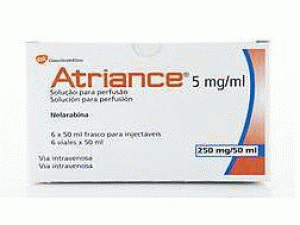奈拉滨注射剂nelarabine(Arranon 250mg/mL 50mL)
 产地国家:美国
处方药:是
所属类别: 250毫克 50毫升/瓶 6瓶/盒
包装规格: 250毫克 50毫升/瓶 6瓶/盒
计价单位:盒
生产厂家英文名:NOVARTIS PHARMACEUTICALS
原产地英文商品名:ARRANON 250MG 50ML 6=
原产地英文药品名:nelarabine
中文参考商品译名:阿仑恩注射剂 250毫克 50毫升/瓶 6瓶/盒
中文参考药品译名:奈拉滨
曾用名:阿仑恩 NDC: 00078-0683-06
产地国家:美国
处方药:是
所属类别: 250毫克 50毫升/瓶 6瓶/盒
包装规格: 250毫克 50毫升/瓶 6瓶/盒
计价单位:盒
生产厂家英文名:NOVARTIS PHARMACEUTICALS
原产地英文商品名:ARRANON 250MG 50ML 6=
原产地英文药品名:nelarabine
中文参考商品译名:阿仑恩注射剂 250毫克 50毫升/瓶 6瓶/盒
中文参考药品译名:奈拉滨
曾用名:阿仑恩 NDC: 00078-0683-06
简介:
近日,美国FDA批准其Arranon(nelarabine)注射剂用于至少接受过两种化学疗法之后病情复发或对药物无应答的T细胞急性淋巴细胞性白血病(T-ALL)和T细胞淋巴瘤(T-LBL)患者。批准日期:2005年10月 公司:NOVARTIS PHARMACEUTICALSARRANON(奈拉滨[nelarabine])注射液,用于静脉注射美国最初批准:2005年警告:神经不良反应请参见完整的BOXED警告的完整预定信息。使用ARRANON报道了严重的神经系统不良反应。这些不良反应包括改变的精神状态,包括严重的嗜睡,包括抽搐在内的中枢神经系统影响,以及从麻木和感觉异常到运动无力和瘫痪的周围神经病变。还有报道称与脱髓鞘相关的不良反应,以及与吉兰 - 巴雷综合征外观相似的上行周围神经病变。ARRANON治疗停止后,并非总能从这些不良反应中完全康复。经常监测神经系统毒性的症状和体征。停止ARRANON治疗NCI不良事件常见毒性标准(CTCAE)2级或更高级别的神经系统不良反应。最近的重大变化警告和注意事项,神经不良反应:11/2018警告和注意事项,胚胎 - 胎儿毒性:7/2018警告和注意事项,对驾驶和使用机器的影响:7/2018 作用机制:Nelarabine是脱氧鸟苷类似物9-β-D-阿拉伯呋喃糖基鸟嘌呤(ara-G)的前药,一种核苷代谢抑制剂。Nelarabine通过腺苷脱氨酶(ADA)去甲基化为ara-G,通过脱氧鸟苷激酶和脱氧胞苷激酶单磷酸化,随后转化为活性5'-三磷酸,ara-GTP。白血病母细胞中ara-GTP的累积允许掺入脱氧核糖核酸(DNA),导致DNA合成和细胞死亡的抑制其他机制可能有助于奈拉滨的细胞毒性和全身毒性。 适应症和用法:ARRANON是一种核苷代谢抑制剂,用于治疗患有T细胞急性淋巴细胞白血病和T细胞淋巴母细胞淋巴瘤的患者,这些患者在用至少两种化疗方案治疗后没有反应或复发。该用途基于完整响应的诱导。尚未进行证实存活率增加或其他临床获益的随机试验。 剂量和给药:(1)成人剂量:1,500mg/m 2,在第1天,第3天和第5天静脉注射2小时,每21天重复一次。(2)小儿剂量:650mg/m 2静脉内给药,每天1小时,连续5天,每21天重复一次。停止治疗大于或等于2级的神经系统反应。剂量可能因血液学反应而延迟。采取措施预防高尿酸血症。 剂量形式和强度注射:250mg/50mL(5mg/mL)单剂量小瓶 禁忌症:没有 警告和注意事项: 神经不良反应:已报道严重的神经系统反应。监测神经系统毒性的症状和体征。 血液学反应:应定期监测包括血小板在内的全血细胞计数。 胚胎-胎儿毒性:可能导致胎儿伤害。告知女性有可能对胎儿造成潜在风险并使用有效避孕措施;并建议男性使用安全套。 对驾驶和使用机器的能力的影响:可能发生嗜睡。建议患者在嗜睡消退之前不要进行这些活动。 不良反应: 最常见(≥20%)的不良反应是(1)成人:贫血,血小板减少,中性粒细胞减少,恶心,腹泻,呕吐,便秘,疲劳,发热,咳嗽和呼吸困难。(2)儿科:贫血,中性粒细胞减少,血小板减少和白细胞减少。 最常见(>10%)的神经系统不良反应是:(1)成人:嗜睡,头晕,周围神经系统疾病,感觉减退,头痛和感觉异常。(2)小儿:头痛和周围神经系统疾病。 药物相互作用:不建议与腺苷脱氨酶抑制剂如喷司他丁联合给药。 用于特定人群: 肾功能损害:密切监测中度或重度肾功能损害患者的毒性。 肝功能损害:密切监测严重肝功能损害患者的毒性。 哺乳期:建议女性不要母乳喂养。 包装提供/存储和处理:ARRANON注射液是I型透明无色无菌溶液,透明玻璃单剂量小瓶,带有灰色溴化丁基橡胶塞(不是用天然橡胶乳胶制成)和红色弹簧铝密封。 每瓶含有250毫克奈拉滨(每毫升5毫克奈拉滨)和50毫升注射用水中的非活性成分氯化钠(4.5毫克/毫升),USP。单剂量小瓶(NDC 0078-0683-61)有以下纸箱尺寸:NDC 0078-0683-06(包装6)。将ARRANON(尼拉滨)注射液储存在25ºC(77ºF); 允许偏移15ºC至30ºC(59ºF至86ºF)。 参见USP受控室温。英文版说明书:
aImportant Safety InformationARRANON(nelarabine) Injection should be administered under the supervision of a physician experienced in the use of cancer chemotherapeutic agents.This product is for intravenous use only.Neurologic Events: Severe neurologic events have been reported with the use of ARRANON. These events have included altered mental statesincluding severe somnolence, central nervous system effects including convulsions, and peripheral neuropathy ranging from numbness and paresthesias to motor weakness and paralysis.There have also been reports of events associated with demyelination, and ascending peripheral neuropathies similar in appearance toGuillain-Barré syndrome.Full recovery from these events has not always occurred with cessation of therapy with ARRANON. Close monitoring for neurologic events is strongly recommended, and ARRANON should be discontinued for neurologic events of NCI Common Toxicity Criteria grade 2 or greater.In clinical studies of ARRANON, hematologic toxicity was the most common grade 3 (moderate) or 4 (severe) adverse event.Hematologic toxicity included neutropenia, thrombocytopenia, anemia, febrile neutropenia, or neutropenia with infection.Other common toxicities included laboratory abnormalities including increased transaminases, gastrointestinal toxicity, fatigue, and asthenia.Patients treated previously or concurrently with intrathecal chemotherapy or previously with craniospinal irradiation may be at increased risk for neurologic adverse events.Women of child-bearing potential should be advised to avoid becoming pregnant while receiving treatment with ARRANON.Appropriate measures (e.g., hydration, urine alkalinization, and prophylaxis with allopurinol) must be taken to prevent hyperuricemiaof tumor lysis syndrome.Nursing should be discontinued in women who are receiving therapy with ARRANON.Because the risk of adverse reactions to this drug may be greater in patients with severe renal impairment (CLcr <30 mL/min), these patients should be closely monitored for toxicities when treated with ARRANON.Because the risk of adverse reactions to this drug may be greater in patients with severe hepatic impairment (bilirubin >3.0 mg/dL), these patients should be closely monitored for toxicities when treated with ARRANON.用药温馨提示:当您服用此药物时,需定期接受医疗专业人士的检查,以便随时针对其药效、副作用等情况进行监测。本网站所包含的信息旨在为患者提供帮助,不能代替医学建议和治疗。
药品价格查询,专业药品查询网站,药品说明书查询,药品比价 » 奈拉滨注射剂nelarabine(Arranon 250mg/mL 50mL)
药品价格查询,专业药品查询网站,药品说明书查询,药品比价 » 奈拉滨注射剂nelarabine(Arranon 250mg/mL 50mL)


